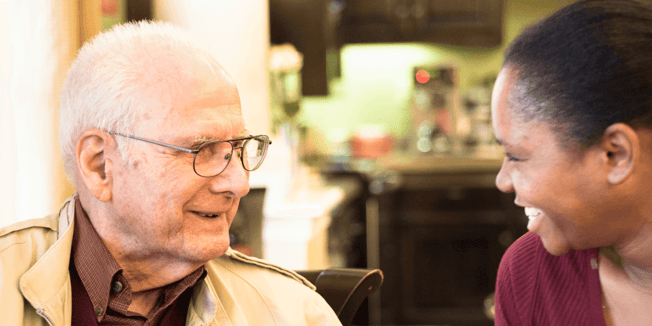The Benefits of Personalized Daily Routines in Alzheimer’s Care
Wiki Article
Discover Compassionate Memory Care: Enhancing High Quality of Life for Loved Ones
The trip of caring for a liked one with cognitive problems presents special obstacles that can profoundly affect family members dynamics and emotional wellness. Thoughtful memory care centers provide a structured, encouraging setting designed to deal with these obstacles while boosting the quality of life for locals. By concentrating on customized care and purposeful engagement, these facilities not only uplift those impacted by conditions like Alzheimer's and mental deterioration yet additionally give peace of mind for families. As we explore the vital aspects of thoughtful memory care, it comes to be clear that recognizing these alternatives can make a substantial distinction in the lives of all entailed.
Recognizing Memory Care
Comprehending memory care entails acknowledging the specialized assistance and services made to help people with cognitive disabilities, such as Alzheimer's disease and various other forms of mental deterioration. Memory care facilities concentrate on creating a risk-free and structured atmosphere that advertises the wellness of homeowners while addressing their one-of-a-kind cognitive challenges.Key components of memory care consist of trained personnel that are experienced about the complexities of mental deterioration and related problems. These professionals utilize evidence-based practices to improve cognitive feature and maintain dignity via individualized care plans. The physical setting is also tailored to lessen complication and promote experience, often featuring safe locations to avoid wandering. Boutique Memory Care Charlotte.Moreover, memory care stresses social interaction and purposeful tasks that stimulate cognitive capabilities and foster links among locals. This strategy identifies the importance of preserving social communications to battle isolation typically experienced by people with memory loss.Families play an important function in memory care, as their participation aids create a supportive network that enhances the lives of citizens. By recognizing the customized nature of memory care, families can make informed choices to enhance the high quality of life for their liked ones dealing with cognitive problemsTrick Attributes of Compassionate Care
Thoughtful care in memory care setups is defined by an alternative method that prioritizes the emotional and psychological well-being of residents. Trick attributes of this technique consist of individualized care plans customized per citizen's special requirements, preferences, and biography. This customization promotes a sense of identity and belonging, which is essential for those experiencing cognitive decline.Another essential attribute is the existence of qualified staff that are not only skilled in mental deterioration care however also compassionate and understanding. These caregivers take part in purposeful interactions, using strategies such as validation treatment to get in touch with locals and reduce sensations of disappointment or anxiety.Additionally, compassionate care settings prioritize sensory excitement and restorative tasks that resonate with residents' rate of interests. This may consist of art therapy, songs sessions, and reminiscence tasks, all designed to boost cognitive function and psychological connection.Furthermore, family participation is encouraged, enabling loved ones to take part in care activities and support their family members member's psychological needs. Eventually, the key functions of thoughtful care produce a setting where locals really feel safe, valued, and comprehended, substantially improving their top quality of life.Benefits for Locals and Family members

Activities That Foster Interaction
Purposeful tasks play an important function in cultivating involvement among locals in memory care settings. These tasks not just boost cognitive feature but also promote social interaction, emotional wellness, and a feeling of objective. Customized programs that take into consideration residents' interests and abilities are essential for maximizing participation and enjoyment.Creative quests, such as painting, crafting, or music therapy, encourage self-expression and can evoke enjoyable memories. Structured exercise sessions, including chair yoga or strolling teams, boost physical wellness while giving possibilities for socializing. In addition, memory treatment, which includes talking about past experiences and noteworthy life events, can reinforce links in between citizens and caregivers.Incorporating interactive games, puzzles, and even horticulture can better boost cognitive interaction and foster team effort among residents. Routinely scheduled team tasks, such as film nights or themed events, develop a sense of community, permitting homeowners to develop friendships and share experiences.Ultimately, the execution of diverse activities tailored to specific preferences is important in memory care. By advertising interaction through purposeful shows, facilities can greatly boost the high quality of life for residents, guaranteeing they feel valued and attached within their neighborhood.Picking the Right Memory Care Facility
Picking a memory care center involves mindful consideration of numerous elements that impact the wellness of residents. Begin by reviewing the facility's total environment, making particular it is safe, inviting, and developed to lower confusion. Try to find spaces that motivate social interaction while supplying privacy for personal reflection.Next, analyze the certifications and training of the team. Caring for individuals with memory problems requires specialized understanding. Validate that personnel obtain ongoing training in mental deterioration care and use compassionate interaction techniques.Additionally, consider the series of solutions supplied, such as individualized care plans, healing activities, and support for relative. A center that emphasizes alternative care can substantially enhance the high quality of life for residents.Visit possible centers to observe interactions between personnel and citizens, and inquire about their approach to find engaging those with memory difficulties. Inspect testimonials and look for referrals from healthcare professionals or regional support groups.Lastly, think about the center's area and access for family members visits, as regular contact can enhance locals' emotional wellness. By taking these aspects right into account, you can make a well-informed choice that ideal sustains your liked one's requirements.Often Asked Concerns
What Certifications Do Memory Care Personnel Usually Possess?
Memory care staff usually hold certifications that include specialized training in dementia and Alzheimer's care, as well as qualifications in emergency treatment and CPR. Numerous have backgrounds in nursing or social work, giving them with crucial skills in person evaluation and emotional support. Alzheimer’s Care. Additionally, recurring education and learning in behavioral management techniques and interaction methods is typical, ensuring team stay proficient at addressing the one-of-a-kind requirements of individuals with cognitive problems while promoting a supportive settingExactly How Can Families Join Their Loved One's Care?

What Is the Price Array for Memory Care Providers?
The expense variety for memory care services can vary considerably based on factors such as area, center features, and level of care required. Generally, family members might anticipate to pay between $4,000 and $8,000 per month. Added solutions, specialized programs, and personal lodgings can further influence rates. Alzheimer’s Care. It is a good idea for households to thoroughly study and browse through centers to comprehend what is included in the costs and check out financial aid choices offeredExist Certain Dietary Options Available for Locals?
Yes, many memory care centers provide tailored nutritional choices to fulfill the certain nutritional demands of locals. These options commonly think about various nutritional restrictions, such as diabetes mellitus, heart health and wellness, or allergies. Facilities commonly employ qualified dietitians to produce dish plans that advertise overall wellness while considering private preferences. Furthermore, relative are generally encouraged to join discussions pertaining to dietary selections to guarantee that their liked ones' preferences and demands are valued.How Are Emergency Situations Handled in Memory Care Facilities?
Emergency situations in memory care centers are handled via developed protocols made to guarantee resident security and speedy reaction. Personnel are educated in emergency treatments, consisting of emergency treatment and discharge plans - Memory Care Charlotte. Facilities conduct normal drills to prepare for different scenarios, such as clinical emergencies, fires, or all-natural calamities. Additionally, interaction systems remain in location to sharp staff and emergency services immediately, ensuring that locals get prompt focus and care during vital scenariosReport this wiki page